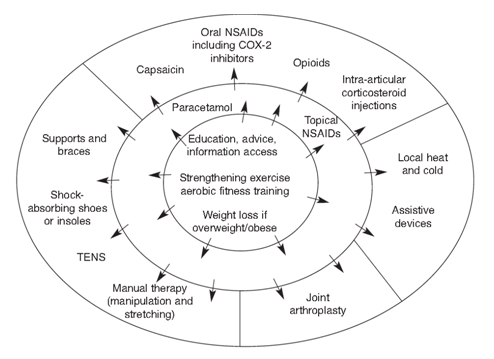Conclusions
It is clear from this evidence review that there is no single solution for General Practitioners to help people with osteoarthritis and that a holistic approach that reflects the needs of the patient is paramount. Once the diagnosis has been made, empowering patients to make major behavioural changes to their lifestyle is essential to the successful management of OA. Shared Decision Making tools and additional training may help GP’s in this respect in offering clear evidence based information from which patients can make an informed decision and increase the likelihood of success. These changes need to be relevant to the patient and have achievable, measureable goals both in the short and long term.

Fig.2. Targeting treatment algorithm
COX-2 = cyclooxegenase-2; NSAIDs = non-steroidal anti-inflammatory drugs; TENS = transcutaneous electrical nerve stimulation(NICE 2008).
Self management requires a ‘toolbox’ approach of core treatments of good information, exercise and weight loss (if appropriate) and adjuncts which all need to be made available and can be trialled if required (see Fig.2.). Careful evaluation and review of current and planned initiatives needs to take place to ensure that the interventions being offered are patient centred, evidence based and cost effective.

